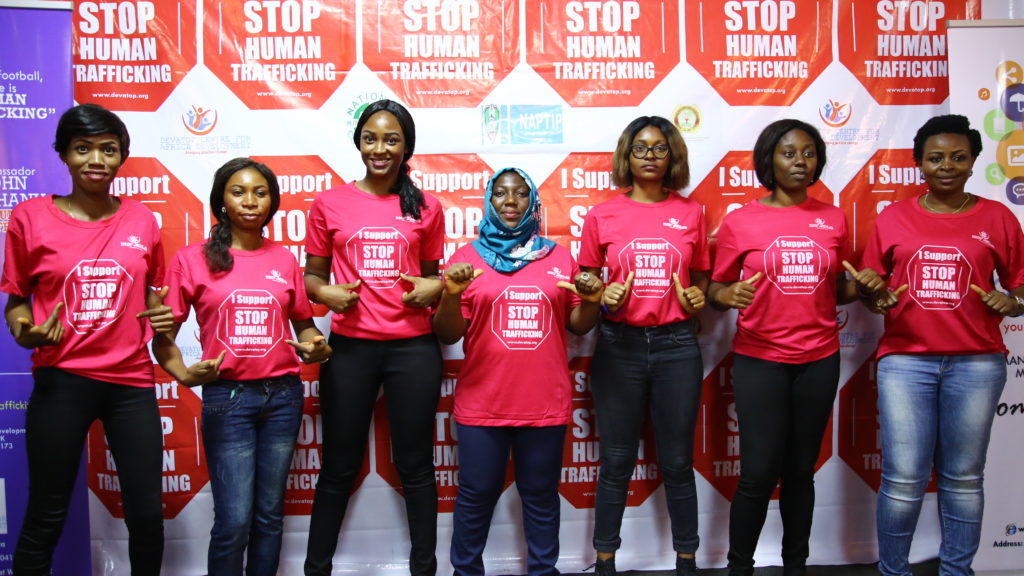14 Facts About Human Trafficking in Nigeria

1. According to U.S Department of State, Nigeria is a source, transit, and destination country for women and children subjected to trafficking in persons including forced labor and forced prostitution.
2. Trafficked Nigerian women and children are recruited from rural areas within the country’s borders − women and girls for involuntary domestic servitude and sexual exploitation, and boys for forced labor in street vending, domestic servitude, mining, and begging.
3. An average Nigerian thinks that human trafficking is only when girls and women are forcefully moved from Nigeria to Europe, like Italy. They also think that human trafficking is a foreign issue.
4. An important characteristic of the Nigerian sex trafficking system is the use by the traffickers of threats of voodoo curses to control Nigerian victims and force them into situations of prostitution. During the ritual, in which body parts such as fingernails, blood and/or pubic hairs are recollected, the woman is made to swear an oath to repay her debt, never to report her situation to the police or reveal the identities of her traffickers. Fear of breaking the pact is so strong that it creates a powerful hold over the victims and impedes them to seek help. According to the National Agency for Prohibition of Traffic in Persons about 90 per cent of girls that are been trafficked to Europe are taken to shrines to take ‘oaths of secrecy’
5. There is no data (statistics) of people trafficked within and outside Nigeria. There is also no indigenous statistics of how many Nigerians are victims, except the one from foreign researchers and United Nations.
6. According to 2016 Global Slavery Index Report, there are 875, 500 Nigerians who are victims of modern slavery.
7. Nigeria is among the countries that have the highest number of human trafficking victims.
8. Human traffickers or perpetrators often see young people, especially women, girls and children as commodities that can generate 100 times of the amount spent on recruiting them.
9. Nigerian victims are lured to donate their organ, give up their organs, or sell their organs at a very cheap rate; thereafter the traffickers resell the organs to desperate buyers who pay huge sum of money.
10. More young people are getting trapped by the perpetrators, and becoming victims of human trafficking.
11. Millions of Nigerian young women, girls, boys, youth and children are at risk of human trafficking due to the following contributing factors: illiteracy, ignorance, greed, lack of opportunity, inequality, gender-induced cultural bias, persistent unemployment, poverty (a principal driving force), large family size; family crisis; community crisis; high demand for cheap labour; desire for youth emancipation; inadequate political commitment; porous borders, lack of strong political will; lack of access to education, sex-selective migration policies, disruption of supportive system, traditional community attitude, manipulation of religious rituals, lost of parents, human deprivation, insurgency, etc.
12. Young people who are trafficked are used for sexual exploitation, labour exploitation (forced, bonded and child labour), begging, organ harvesting, suicide bombing & child soldier, forced marriage, baby factory, and rituals.
13. Nigerian government (as of 2011 to 2017) has not prioritized the fight against human trafficking nor provided minimum funding to agencies and non-governmental organizations to combat human trafficking.
14. Apart from National Agency for Prohibition of Trafficking in Persons (NAPTIP), there are anti-human trafficking organizations in Nigeria who are at the forefront of combating human trafficking. Some of them include: Devatop Centre for Africa Development, Women Trafficking and Child Labour in Nigeria, Network of Civil Society Organizations Against Child trafficking and Labour (NACTAL).
